Sir Fazle Hasan Abed was recently on the University of Michigan campus to receive a global health award. While there, he sat down with Kyle Poplin, editor for NextBillion Healthcare, an initiative of WDI, to talk about his work in Bangladesh. This article was originally published April 13, 2016 on NextBillion.
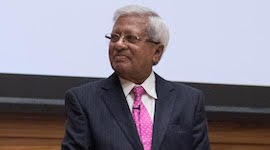
It was 1972 and Bangladesh was “an international basket case.” The Liberation War had just ended and the country was still reeling from the deadliest tropical cyclone ever recorded, Bhola, two years before.
The desperate conditions in his native country convinced Fazle Hasan Abed to quit his executive job at Shell Oil and try to help. But he couldn’t have foreseen the impact he would have on Bangladesh – and the world – when he founded what was originally a short-term relief effort called the Bangladesh Rural Advancement Committee.
That original group of a couple dozen people grew into what is now called BRAC, the largest non-governmental development organization in the world, with a $1 billion budget and 111,000 employees offering services to 138 million people. And Bangladesh, not coincidentally, has transitioned from the world’s second poorest country to lower middle income.
BRAC’s overarching philosophy is that poverty has many causes, so many solutions are needed. The organization provides programs in microfinance, education, health care, job training, empowerment of women, sanitation, agriculture, etc., and owns 16 social enterprises that provide $700 million in revenue. The remaining $300 million in revenue is generated through donations.
Abed – now officially Sir Fazle after being knighted by Queen Elizabeth II – has been called one of the world’s 50 greatest leaders, and was hailed as “a public health hero” when the University of Michigan awarded him one of its most prestigious honors, the Thomas Francis Jr. Medal in Global Public Health, on April 6.
The next day, in a sit-down interview with NextBillion, the 80-year-old talked about his four-decades-and-counting quest to empower the poor.
“The greatest influence on me about people’s lives and poverty was my mother. She was very concerned about poverty and poor people and she tried to help them as much as she could,” he said. “(After starting BRAC) I got to know poverty firsthand in the villages of Bangladesh. I became more aware of the multidimensional aspect of poverty. It’s not just lack of income, it’s lack of opportunities, lack of health care, lack of education. It’s all kinds of deprivation that constitutes poverty. Ultimately, it’s also powerlessness to do something about poverty, how to come out of it.
“In the old days, one used to think that one takes resources to the poor people and distributes them, and they come out of poverty. But we thought you have to involve the poor people themselves in the fight against poverty.”
He said he developed that concept – considered revolutionary in the ’70s – from reading “Pedagogy of the Oppressed” by Brazilian educator Paulo Freire. “Oppressed people have got their own way of thinking about life,” Abed said, “and if you can somehow mobilize them, make them critically aware of their own condition, and get them to act on their own behalf, make them an actor in their own history, then things become much easier.”
Perhaps the best example of Abed and BRAC putting that idea into practice was an oral rehydration therapy (ORT) program aimed at ultra-poor women in Bangladesh starting in the early 1980s. Diarrheal disease, the second leading cause of death in children under age 5, leads to dehydration, but it can treated with a simple mixture of water, sugar and salt known as ORT. Conventional wisdom held that illiterate, uneducated women were incapable of properly mixing and administering ORT, but BRAC taught millions of women from Bangladesh’s slums and villages how to do it. And today Bangladesh’s ORT rates are among the best in the world.
BRAC also pioneered a “graduation model” that empowers the ultra-poor to move from safety net programs to income-earning activities and self-sufficiency.
In the free-ranging video interview below, Abed talks more about BRAC’s future than its illustrious past.
He’s optimistic, for example, about the next generation of businesses that might help support BRAC, highlighted by a transition from a free to paid education model. He believes everyone can afford to pay $10 to $15 a month to ensure their children’s future, so BRAC is “looking into providing quality education for poor people.”
He’s wary of religious fundamentalism. The interview was conducted the day after a secular blogger was hacked to death in Bangladesh – the fourth such incident this year – in an attack attributed to a local chapter of al-Qaeda. Abed said that while “intolerant religion is becoming quite a force in our society,” it hasn’t yet had much of an impact on BRAC’s empowerment efforts, specifically of women, and he hopes such intolerance can be kept under control.
And he’s certain that it is, indeed, possible to eliminate extreme poverty worldwide, in accordance with Sustainable Development Goal No. 1. As one might expect, he’s got a plan in mind:
Ray Cummings, director of market dynamics for the global nonprofit health organization PATH, recently sat down for a one-on-one video interview with WDI’s Andrea Bare to discuss how it works to improve global health outcomes. The two also talked about Cummings’ career and how U-M students interested in the healthcare field can get involved in global health.
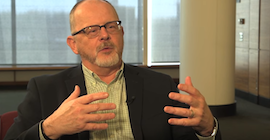
Cummings also spoke to U-M students for the WDI Global Impact Speaker Series on Feb. 17 about how PATH is addressing the challenge of improving coverage rates for many childhood vaccines in low-income countries.
“Ray has deep expertise in healthcare technology development and commercialization in both developed and emerging economies,” said Bare, senior advisor in the WDI Healthcare Initiative’s Market Dynamics group. “He works from the vantage point of several years in biopharmaceuticals business development and partnering, and has brought that expertise to PATH where he has led or contributed to projects for drugs, vaccines, and diagnostics in diseases such as malaria, HIV, and Japanese Encephalitis.”
Cummings’ market dynamics department provides analytical and strategic support for PATH programs that are working with both non-profit and commercial partners to develop new therapies, vaccines and diagnostics for underserved populations around the world. He also has served as commercialization director for PATH’s drug development global program, and senior business officer in its vaccine and pharmaceutical technologies group.
Cummings is the second Global Impact Speaker from PATH. In 2013, Amie Batson, chief strategy officer of PATH, spoke for the WDI speaker series. View a one-on-one interview with Batson here.
Also, PATH has partnered with WDI on several summer internship projects, including 2011 in Bangladesh, 2012 in India, 2013 in Vietnam and Cambodia, and 2015 in the U.S., South Africa, Ghana, and Uganda.
WDI and PATH are currently discussing the scope of a 2016 summer internship with the organization.
Prior to joining PATH in 2009, Cummings held senior business development positions at AVI BioPharma, Inc. (now Sarepta Therapeutics), GD Searle & Co., and Immunex Corp. (now part of Amgen Inc.).
Cummings has a bachelor’s degree in biological sciences from Stanford University, a master’s degree in biochemistry and molecular biology from Harvard University, and an MBA from the University of California, Berkeley.
WDI’s Scaling Impact Initiative is working with Walmart to chronicle what the retail giant has learned from its efforts to include small producers in global supply chains.
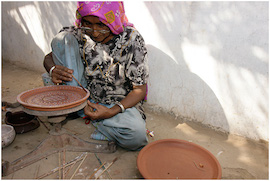
The successes, challenges, and lessons learned will become a policy brief and a teaching case, both written by WDI in collaboration with Professor Linda Scott of Oxford University’s Said Business School. Both documents will be published this spring, and are geared toward Walmart and other retailers looking to develop more effective sourcing programs in the future.
WDI Vice President of Scaling Impact Ted London and Research Manager Colm Fay, along with Scott, are studying two Walmart programs.
One is Empowering Women Together, which sources handicrafts from women-owned base of the pyramid businesses in East Africa, Nepal, India and other emerging markets to sell online. The other is Direct Farm, which buys fresh fruits and vegetables from small- and medium-sized farmers to supply Walmart’s stores in Central and South America, Mexico, South Africa, and India.
The team has interviewed managers from Walmart, the Walmart Foundation, and their implementing partners.
This is the second collaboration between WDI and Walmart. Last year, WDI Publishing released a case study on the evolution of a global cross-sector partnership between Walmart and the United States Agency for International Development (USAID). The case looked at what had been gleaned – both positive and negative – during the 15-year collaboration between the two organizations.
The free case, “Walmart and USAID: The Evolution of a Global Cross-Sector Partnership,” focused on partnerships that sought to engage smallholder farmers in the developing world, and highlighted examples from Honduras, Guatemala, Rwanda and Bangladesh. It explored the ways in which these collaborations came about, how they were supported by the partners, and the level of success achieved as measured by Walmart, the Walmart Foundation, and USAID.
The case also identified lessons learned for the future of the Walmart/USAID collaboration, and insights that may apply to the development of public-private partnerships for development more broadly.
In addition, NextBillion’s Kyle Poplin wrote a post on how the case was developed. And Beth Keck, senior director of Women’s Economic Empowerment at Walmart, sat down for a video interview with WDI’s London about the company’s global work.
Image courtesy of Navel Zaveri/Flickr.
Vaccines save 2.5 millions lives annually according to the World Health Organization, and during the past 15 years major strides have been made in coverage rates for many childhood vaccines in low-income countries.
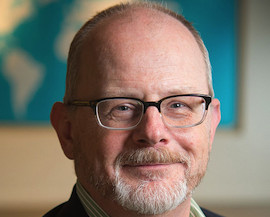
However, challenges remain as evidenced by the 1.5 million children under the age of 5 who still die each year from vaccine-preventable illnesses. Reducing this number will require progress on a range of economic issues related to vaccine procurement funding, reductions in vaccine costs, and economic sustainability of existing vaccine products.
Ray Cummings, director of market dynamics for PATH, will discuss how the Seattle-based international, nonprofit health organization is addressing these challenges as part of the WDI Global Impact Speaker Series.
Cummings’ Feb. 17 talk, “Economics of Global Vaccine Markets and Current Challenges,” will begin at 5 p.m. in Room R2220 at the Ross School of Business. It is free and open to the public.
“Ray has deep expertise in healthcare technology development and commercialization in both developed and emerging economies,” said Andrea Bare, senior advisor in the WDI Healthcare Initiative’s Market Dynamics group. “He works from the vantage point of several years in biopharmaceuticals business development and partnering, and has brought that expertise to PATH where he has led or contributed to projects for drugs, vaccines, and diagnostics in diseases such as malaria, HIV, and Japanese Encephalitis.”
Cummings’ market dynamics department provides analytical and strategic support for PATH programs that are working with both non-profit and commercial partners to develop new therapies, vaccines and diagnostics for underserved populations around the world. He also has served as commercialization director for PATH’s drug development global program, and senior business officer in its vaccine and pharmaceutical technologies group.
Cummings is the second Global Impact Speaker from PATH. In 2013, Amie Batson, chief strategy officer of PATH, spoke for the WDI speaker series. View a one-on-one interview with Batson here.
Also, PATH has partnered with WDI on several summer internship projects, including 2011 in Bangladesh, 2012 in India, 2013 in Vietnam and Cambodia, and 2015 in the U.S., South Africa, Ghana, and Uganda.
WDI and PATH are currently discussing the scope of a 2016 summer internship with the organization.
Prior to joining PATH in 2009, Cummings held senior business development positions at AVI BioPharma, Inc. (now Sarepta Therapeutics), GD Searle & Co., and Immunex Corp. (now part of Amgen Inc.).
Cummings has a bachelor’s degree in biological sciences from Stanford University, a master’s degree in biochemistry and molecular biology from Harvard University, and an MBA from the University of California, Berkeley.
Surabhi Rajaram, a WDI intern working in Bangladesh this summer for CARE, recently wrote a blog entry looking back on her two months in a very remote area of that country.
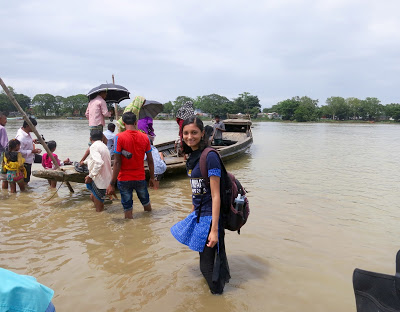
Rajaram, a graduate student in the School of Public Health, used a “by the numbers” format to write about the things she learned on her internship, which built on work of existing CARE projects that address critical gaps in skilled human resources by developing private community health care providers. She spent the first two months of her internship in the Sunamganj region. The last month will be spent at CARE headquarters in the capital city of Dhaka.
Rajaram assisted in the design of individual business plans for these pools of local health workers. She facilitated implementation of an inclusive business model that holds the potential to address those gaps and improve rural health care systems in a sustainable, replicable and scalable manner. She also worked closely with both Health and Private Sector Engagement (PSE) units of CARE Bangladesh.
Read her blog entry here.
She is one of 13 WDI summer interns contributing to a blog.
Read the entire blog here.
CARE is one of the world’s largest private international humanitarian organizations, committed to helping families in poor communities improve their lives and achieve lasting victories over poverty. CARE wanted to improve its ability in the Base of the Pyramid (BoP) field and establish a Center of Excellence focused on social enterprises and BoP. Ross student intern Shveta Suneja laid the foundation for the center by identifying high level goals, methodology for extracting and synthesizing knowledge, and developing a proposal for long term funding.
The Integrated Development Foundation (IDF) is a non-profit organization that combats poverty in the impassable hilly regions and other underserved areas of Bangladesh. School of Natural Resources and Environment (SNRE) student Arturo Huesca studied the feasibility of ecotourism in Chittagong Hill Tracts (CHT), as well as Bangladesh in general. The feasibility study was used by IDF, the Bangladesh government, CHT Regional Council, interested investors in ecotourism in CHT and Bangladesh, the Networking Body and Associations on ecotourism; and other organizations.
CARE Bangladesh looks to achieve lasting impact at broad scale on underlying causes of poverty and social injustice. For four years, CARE had been trying to increase the incomes of small dairy farmers. However, CARE was challenged by improving access to inputs and veterinary services. So, the organization implemented a microfranchise pilot project. The student MAP team reviewed CARE’s current model compared to other models globally. The team also conducted market feasibility studies in Bangladesh and developed a preliminary business plan. Finally, the team reviewed business training and operational materials to be tested in the microfranchise shops.
CARE Bangladesh looks to achieve lasting impact at broad scale on underlying causes of poverty and social injustice. The student MAP team drafted a business plan and a set of recommendations for scaling CARE Bangladesh’s workforce training and empowerment model to local female garment workers. In 2009, a student MAP team worked with CARE to explore the feasibility of applying a base of the pyramid distribution model for clean energy in Uganda.
The goal of GE Healthcare’s Rural Health Initiative is to provide low-cost, appropriate diagnostic technology in rural areas of developing countries to improve clinical efficacy and tangibly improve public health outcomes. The student team assessed the entrepreneurial models already in practice with GE Healthcare’s Bangladesh and Indonesian partners, explored the potential for transference of lessons learned from other business models that could fund and scale these rural health entrepreneurship models. In 2010, a student MAP team collaborated with GE Healthcare in India and Bangladesh to propose a variety of recommendations to enhance the effectiveness of the design, implementation, and outcomes of the piloting process for the Rural Health Initiative.